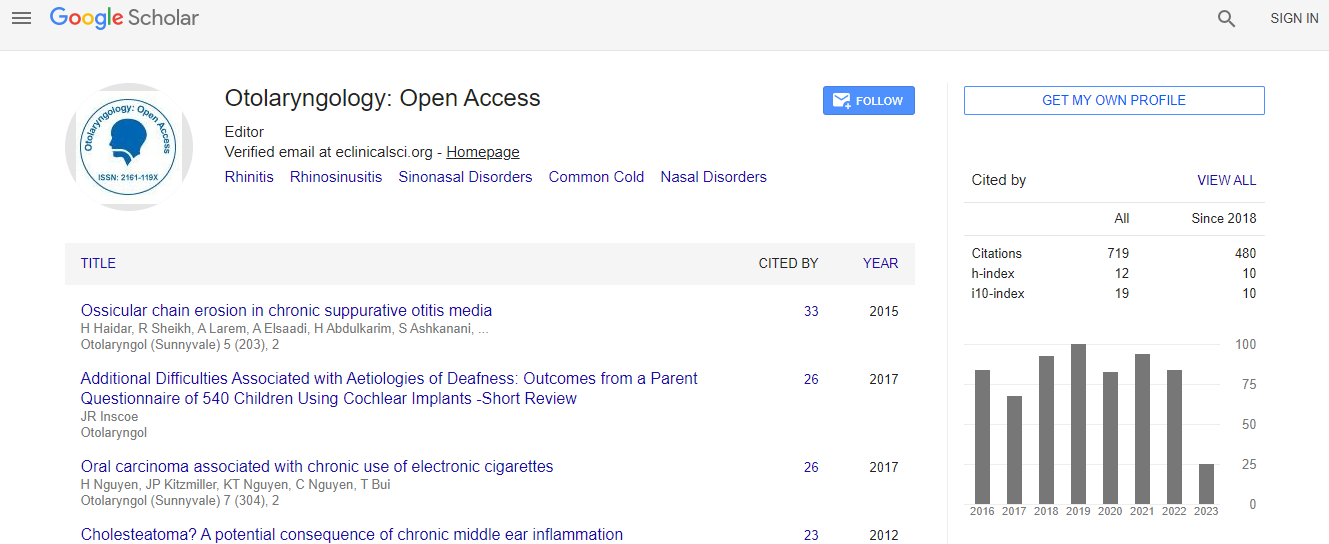Our Group organises 3000+ Global Conferenceseries Events every year across USA, Europe & Asia with support from 1000 more scientific Societies and Publishes 700+ Open Access Journals which contains over 50000 eminent personalities, reputed scientists as editorial board members.
Open Access Journals gaining more Readers and Citations
700 Journals and 15,000,000 Readers Each Journal is getting 25,000+ Readers
Google Scholar citation report
Citations : 925
Otolaryngology: Open Access received 925 citations as per Google Scholar report
Otolaryngology: Open Access peer review process verified at publons
Indexed In
- Index Copernicus
- Google Scholar
- Sherpa Romeo
- Open J Gate
- Genamics JournalSeek
- RefSeek
- Hamdard University
- EBSCO A-Z
- OCLC- WorldCat
- Publons
- Geneva Foundation for Medical Education and Research
- ICMJE
Useful Links
Recommended Journals
Related Subjects
Share This Page
Low Level Laser Therapy and Neuromuscular Electrical Stimulation in ENT Rehabilitation: New therapeutic resource
Joint Event on 4th European Otolaryngology-ENT Surgery Conference & 3rd International Conference on Craniofacial Surgery
Andrea Signoretti
University Center Sao Camilo, Brazil
ScientificTracks Abstracts: Otolaryngol (Sunnyvale)
Abstract
The newest features in speech therapy clinic like Neuromuscular Electrical Stimulation (NMES) , Transcutaneous Electrical Nerve Stimulation (TENS ) and more recently, the Low Level Laser Therapy (LLLT) have been promising and effective in dealing with ENT, both for enabling early intervention as well as speeding up the recovery process. In our clinic, NMES is used to promote sensory and excitatory stimuli extraoral or intraoral, using FORMA® extensors, which facilitate strength gain and endurance of musculature , TENS has been used to relieve pain, reducing fatigue, improving vascularity and helping muscle relaxation and LLLT has biomodulator action in the inflammatory, nociceptive, scarring , edematous, nervous and muscular repair processes. The use of TENS associated with vocal techniques was used in a female patient, 38 years old, teacher, with high vocal demand and with the diagnosis of bilateral sulcus vocalis stria minor and vocal nodules and contributed to total resorption of the vocal nodules. In another case, a 20-year-old patient, Adenotonsillectomy surgical post, evolved with moderate hypernasal resonance focus dysphonia and dysphagia, nasal reflux for liquids. Using NMES at a sensory and excitatory level with the FORMA® extensors on the soft palate and conventional therapy it was possible to recovery functional movement completely of the soft palate, to equilibrate the ressonantal focus and eliminate the symptoms of dysphagia. Several studies has been demonstrated that the LLLT is an alternative to speed up facial normality in pediatric and adult Bell’s Palsy, and it has seen in our clinic too, however, there is no scientific studies to late facial palsy. In an initial process of rehabilitation, using LLLT combined with NMES with the FORMA® extensors, a male, 40 years old, peripheral facial paralysis for 18 years Facial SCHWANNOMA removal post, has shown promising results with improvement of the facial mimic. As we have seen, these new features have great applicability in ENT Rehabilitation. In addition to being considered as a safe, non-invasive, and widely accepted by patients, the combined use of these new techniques with the conventional techniques of speech and language rehabilitation has added efficiency, assertiveness and celerity in the rehabilitation process.Biography
Dr. Andrea Signoretti is a Speech Language Pathologist, specialized in Dysphagia and Voice. Graduate certificate in Neuromuscular Eletrical Stimulation. LSVT® LOUD Certified Clinician to Apply Speech Treatment for Parkinson Disease and Neurological Conditions,.For 27 years worked closely with ENT specialists. Has experience in voice and dysphagia rehabilitation on Otorhinolaryngology demand and Head and Neck Surgery. Worked in several Hospitals, such as HCOR, ICESP, São Camilo and others, for more than 10 years, focusing bedside attendance on neurogenic and mechanical disorders of voice, speech and swallowing. Nowadays, has a private office sharing experiences with her medical colleagues, psychologists and physiotherapists for a multiprofissional attendance.She was born and raised in Sao Paulo, Brazil
E-mail: deasignoretti@yahoo.com.br

 Spanish
Spanish  Chinese
Chinese  Russian
Russian  German
German  French
French  Japanese
Japanese  Portuguese
Portuguese  Hindi
Hindi 
